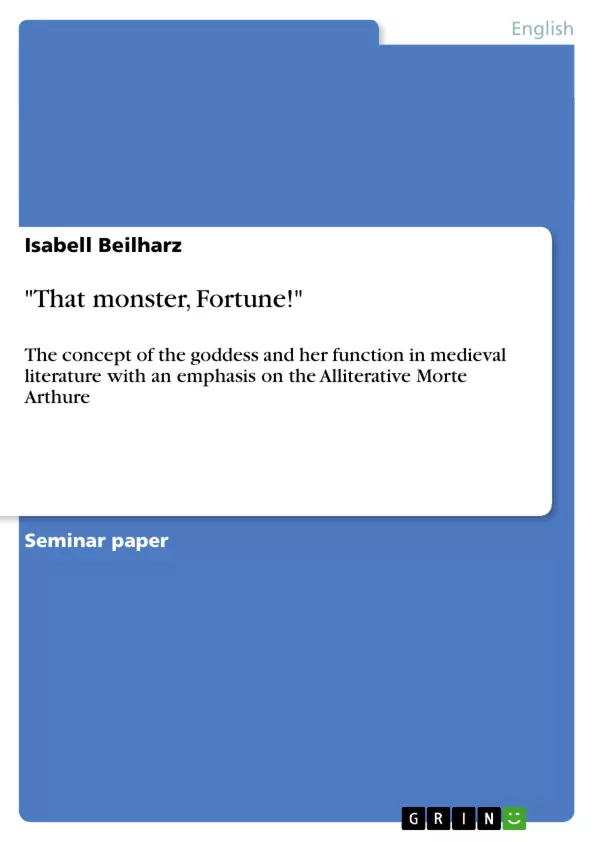The concept of Fortuna and her wheel, or to be more general of fate and fortune itself in ancient and medieval literary and philosophical culture has been the topic of numerous investigations stretching over cultural and temporal boundaries. Beginning with the Roman and early medieval tradition culminating in Boethius De Consolatione Philosophiae scholars have tried to apply the concept of Fortuna to nearly every literary production from Cicero up to Shakespeare’s Renaissance conception of medieval tragedy and Fortune’s influence upon it. On the other hand, Arthurian literature as a literary product has not only influenced the evolution of the European literary canon, but has itself been struck by several literary and philosophical concepts. For Arthurian matters this fusion of traditions becomes most obvious in the anonymously composed Alliterative Morte Arthure; here, both the Boethian and the medieval tradition of Lady Fortune as the mistress of human fate and the hence resulting beginnings of early medieval tragedy come to the surface. As a concept not only closely linked to the wheel of Fortune but also to Arthurian literature per se the topos of the Nine Worthies, introduced for the first time by the fourteenth-century writer Jaques de Languyon in his Veux du Paon, also has to be taken into consideration. The Nine Worthies as a representation of Fortune’s grace and disposal with King Arthur being mentioned in the Alliterative Morte Arthure as one of the greatest amongst them, the fusion of all the concepts mentioned in the above has reached its zenith.
In the following, this paper will try to elaborate on the literary and philosophical concepts mentioned above, with a particular interest in the tradition of Fortuna and her appearance in the Alliterative Morte Arthure. Beginning with the commencements of the topos in late Roman and early medieval literature, I will try to exemplify the development of the concept with reference to Boethius’ De Consolatione Philospohiae and the Italo-English understanding and deployment of the de casibus tragedies, and answer the question of whether or not the AMA can be added to this genre. In doing so, the relation of the Alliterative Morte Arthure to the progress of the medieval tragic concept will be highlighted.
Finally, the Alliterative Morte Arthure will serve as the textual basis when both, the concept of Fortune and the Nine Worthies, as well as their amalgamation will be examined.
Inhaltsverzeichnis (Table of Contents)
- Introduction
- Medieval tragedy and Fortuna
- Early Beginnings
- Boethius and the De Consolatione Philosophiae
- The Consolation and Fortune
- Representation
- Concept
- From antiquity to tragedy...
- The Alliterative Morte Arthure
- The AMA and the formula of the wheel
- King Arthur's dream and Fortune
- Fortune, Arthur and the Nine Worthies
- Conclusion
Zielsetzung und Themenschwerpunkte (Objectives and Key Themes)
This paper examines the interplay of fortune and medieval tragedy in the Alliterative Morte Arthure. It explores the concept of Fortuna, particularly in its representation in Boethius' De Consolatione Philosophiae and the Italo-English tradition of “de casibus” tragedies. By analyzing the text, the author aims to determine whether the AMA can be classified as a medieval tragedy and how it contributes to the development of this genre.
- The evolution and portrayal of Fortuna in Roman, early medieval, and medieval literature
- The influence of Boethius' De Consolatione Philosophiae on medieval conceptions of fortune
- The development of the "de casibus" tragedy genre and its connection to Fortuna
- The role of Fortuna and the Nine Worthies in the Alliterative Morte Arthure
- The classification of the AMA as a medieval tragedy
Zusammenfassung der Kapitel (Chapter Summaries)
The introduction establishes the framework for the paper, focusing on the concept of Fortuna and its relevance to medieval literature, particularly the Alliterative Morte Arthure. It outlines the author's objectives to trace the development of Fortuna in literature, analyze the influence of Boethius' work, and examine the potential classification of the AMA as a medieval tragedy.
The first chapter delves into the origins and evolution of the goddess Fortuna. It discusses her representation in Roman mythology and the contrasting perceptions of her as both a benevolent and capricious deity. The chapter highlights the influence of Hellenistic Tyche on Fortuna's characterization and explores the transformation of Fortuna from a goddess to a divine instrument in Christian thought.
The second chapter explores the contribution of Boethius and his influential work, De Consolatione Philosophiae, to the understanding and depiction of Fortuna in medieval literature. It examines the philosophical and literary significance of the work and its role in establishing Fortuna as a dominant theme within the medieval context.
Schlüsselwörter (Keywords)
This paper examines the concepts of Fortuna, medieval tragedy, the Alliterative Morte Arthure, Boethius' De Consolatione Philosophiae, the Nine Worthies, and the "de casibus" tragedy genre.
Frequently Asked Questions
What is the concept of Fortuna in medieval literature?
Fortuna is portrayed as the mistress of human fate, often represented with a wheel that symbolizes the unpredictable rise and fall of kings and commoners alike.
How did Boethius influence the perception of Fortune?
In "De Consolatione Philosophiae," Boethius transformed the capricious Roman goddess into a divine instrument, helping medieval thinkers reconcile fate with Christian providence.
Can the Alliterative Morte Arthure (AMA) be considered a tragedy?
The paper argues that the AMA aligns with the "de casibus" tragedy genre, where the fall of a great leader like King Arthur is attributed to the turning of Fortune's wheel.
Who are the "Nine Worthies"?
The Nine Worthies are historical and legendary figures (including King Arthur) who represent the pinnacle of chivalry and the ultimate vulnerability to Fortune's disposal.
What role does King Arthur's dream play in the poem?
Arthur's dream of Lady Fortune and her wheel serves as a prophetic warning of his impending downfall and the transitory nature of his earthly power.
- Quote paper
- Isabell Beilharz (Author), 2009, "That monster, Fortune!", Munich, GRIN Verlag, https://www.grin.com/document/139519



